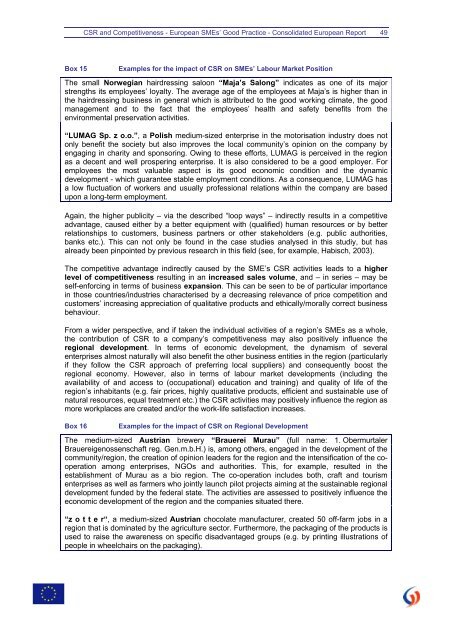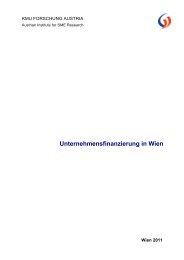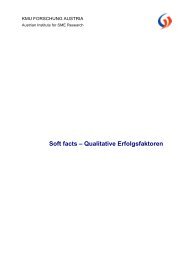CSR and Competitiveness European SMEs - KMU Forschung Austria
CSR and Competitiveness European SMEs - KMU Forschung Austria
CSR and Competitiveness European SMEs - KMU Forschung Austria
Create successful ePaper yourself
Turn your PDF publications into a flip-book with our unique Google optimized e-Paper software.
<strong>CSR</strong> <strong>and</strong> <strong>Competitiveness</strong> - <strong>European</strong> <strong>SMEs</strong>’ Good Practice - Consolidated <strong>European</strong> Report 49<br />
Box 15 Examples for the impact of <strong>CSR</strong> on <strong>SMEs</strong>’ Labour Market Position<br />
The small Norwegian hairdressing saloon “Maja’s Salong” indicates as one of its major<br />
strengths its employees’ loyalty. The average age of the employees at Maja’s is higher than in<br />
the hairdressing business in general which is attributed to the good working climate, the good<br />
management <strong>and</strong> to the fact that the employees’ health <strong>and</strong> safety benefits from the<br />
environmental preservation activities.<br />
“LUMAG Sp. z o.o.”, a Polish medium-sized enterprise in the motorisation industry does not<br />
only benefit the society but also improves the local community’s opinion on the company by<br />
engaging in charity <strong>and</strong> sponsoring. Owing to these efforts, LUMAG is perceived in the region<br />
as a decent <strong>and</strong> well prospering enterprise. It is also considered to be a good employer. For<br />
employees the most valuable aspect is its good economic condition <strong>and</strong> the dynamic<br />
development - which guarantee stable employment conditions. As a consequence, LUMAG has<br />
a low fluctuation of workers <strong>and</strong> usually professional relations within the company are based<br />
upon a long-term employment.<br />
Again, the higher publicity – via the described “loop ways” – indirectly results in a competitive<br />
advantage, caused either by a better equipment with (qualified) human resources or by better<br />
relationships to customers, business partners or other stakeholders (e.g. public authorities,<br />
banks etc.). This can not only be found in the case studies analysed in this studiy, but has<br />
already been pinpointed by previous research in this field (see, for example, Habisch, 2003).<br />
The competitive advantage indirectly caused by the SME’s <strong>CSR</strong> activities leads to a higher<br />
level of competitiveness resulting in an increased sales volume, <strong>and</strong> – in series – may be<br />
self-enforcing in terms of business expansion. This can be seen to be of particular importance<br />
in those countries/industries characterised by a decreasing relevance of price competition <strong>and</strong><br />
customers’ increasing appreciation of qualitative products <strong>and</strong> ethically/morally correct business<br />
behaviour.<br />
From a wider perspective, <strong>and</strong> if taken the individual activities of a region’s <strong>SMEs</strong> as a whole,<br />
the contribution of <strong>CSR</strong> to a company’s competitiveness may also positively influence the<br />
regional development. In terms of economic development, the dynamism of several<br />
enterprises almost naturally will also benefit the other business entities in the region (particularly<br />
if they follow the <strong>CSR</strong> approach of preferring local suppliers) <strong>and</strong> consequently boost the<br />
regional economy. However, also in terms of labour market developments (including the<br />
availability of <strong>and</strong> access to (occupational) education <strong>and</strong> training) <strong>and</strong> quality of life of the<br />
region’s inhabitants (e.g. fair prices, highly qualitative products, efficient <strong>and</strong> sustainable use of<br />
natural resources, equal treatment etc.) the <strong>CSR</strong> activities may positively influence the region as<br />
more workplaces are created <strong>and</strong>/or the work-life satisfaction increases.<br />
Box 16 Examples for the impact of <strong>CSR</strong> on Regional Development<br />
The medium-sized <strong>Austria</strong>n brewery “Brauerei Murau” (full name: 1. Obermurtaler<br />
Brauereigenossenschaft reg. Gen.m.b.H.) is, among others, engaged in the development of the<br />
community/region, the creation of opinion leaders for the region <strong>and</strong> the intensification of the cooperation<br />
among enterprises, NGOs <strong>and</strong> authorities. This, for example, resulted in the<br />
establishment of Murau as a bio region. The co-operation includes both, craft <strong>and</strong> tourism<br />
enterprises as well as farmers who jointly launch pilot projects aiming at the sustainable regional<br />
development funded by the federal state. The activities are assessed to positively influence the<br />
economic development of the region <strong>and</strong> the companies situated there.<br />
“z o t t e r“, a medium-sized <strong>Austria</strong>n chocolate manufacturer, created 50 off-farm jobs in a<br />
region that is dominated by the agriculture sector. Furthermore, the packaging of the products is<br />
used to raise the awareness on specific disadvantaged groups (e.g. by printing illustrations of<br />
people in wheelchairs on the packaging).




